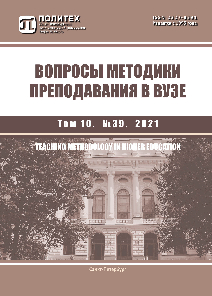Correlation of “humanization” and “humanitarization” concepts in the sphere of education
The aim of the article is to reveal correlations between allied but not identical concepts of “humanization” and “humanitarization” of education. The author considers the processes of humanization and humanitarization as strategic goals of education modernization at different levels. The article introduces the definitions of humanization and humanitarization with reference to their common etymology. The paper analyzes humanization and humanitarization as a strategic vector which defines the development of leaner’s identity in the context of the current postindustrial cultural environment. The article emphasizes the demand for the penetration of the humanist paradigm into the learning process. The relevance of the humanist paradigm is proved by growth trends of conflicts between students and academic teaching staff caused by the transformation of education into the service industry as well as by the contradiction between the recognition of uniqueness of a personal identity and current focus on the consumption of material goods and universalistic values. Humanization and humanitarization of modern education are characterized by multidimensionality, multifactorial nature and continuity due to cultural diversity, different concepts of worldview, aspiration for equitable dialogue and partnership between representatives of different cultural, moral and professional values. The novelty of the research is associated with the comparative analysis of the correlation of such concepts as “humanization of education” and “humanitarization of education” as well as with the consideration of the given concepts in the socio-cultural context. The main research methods are systems analysis and comparative historical analysis. The author comes to the conclusion that humanization is the aim of personality formation, while humanitarization is the means towards this end. Humanitarization fulfills a function of a precautionary instrument which counters dehumanist effects caused by technologization and digitalization of modern education and is regarded as a resource to maintain the balance between natural and virtual environments.



